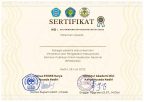ASOSIASI BERAT BADAN DAN PANJANG BADAN LAHIR DENGAN KEJADIAN STUNTING PADA BALITA USIA 24-60 BULAN DI DESA PARON KECAMATAN NGASEM
Keywords:
Balita, Berat Badan Lahir, Panjang Badan Lahir, StuntingAbstract
Stunting is a condition where a child's height is shorter compared to the general height at his age. Stunting can be caused by the baby's weight and birth length. The purpose of this study was to determine the association between body weight and birth length with the incidence of stunting in toddlers aged 24-60 months in Paron Village, Ngasem District. This research design used a cross sectional design with a statistical test of Contingency Coefficient with α = 5%. The sample in this study was 118 toddlers spread across 4 Posyandu in Paron Village with the sampling technique used, namely stratified random sampling. The results of the study on the birth weight of toddlers with stunting incidence showed that toddlers aged 24-60 months who had a normal birth weight and were not stunted by 79.3%. While the birth length of toddlers with stunting shows that toddlers aged 24-60 months who have a normal birth length and are not stunted by 78.4%. The results of the Contingency Coefficient test between body weight and birth length with the incidence of stunting were obtained p-value = 0.490 and 0.396 which showed that there was no association between body weight and birth length with the incidence of stunting in toddlers aged 24-60 months in Paron Village, Ngasem District. In general, the incidence of stunting is not only caused by body weight and birth length, but there are other factors that can affect the incidence of stunting such as insufficient food intake in children. It is recommended that parents monitor the child's development and bring it to the posyandu periodically and provide a nutritionally balanced and varied diet.Downloads
Published
2023-06-30
Issue
Section
Articles
License
Copyright (c) 2023 Prosiding SPIKesNas : Seminar Publikasi Ilmiah Kesehatan Nasional

This work is licensed under a Creative Commons Attribution 4.0 International License.







